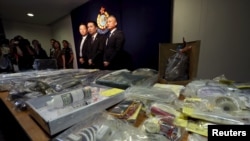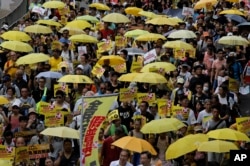Police in Hong Kong say they have arrested nine people and seized explosives, days before lawmakers vote on how the city-state will choose its next leader. Pro-democracy activists say the vote will likely mark the beginning of a longer struggle.
Hong Kong media report that police Monday said the arrests were made during overnight raids, after finding what they believed to be chemicals that could be used to make explosives. The South China Morning Post said that the nine arrested were between the ages of 21 and 34 and part of a radical pro-democracy group near Hong Kong’s border with the mainland.
Police said last week they were stepping up monitoring of online activity to prevent any violence ahead of the vote. But social media posts following questioned the timing of the raids.
Divisions over proposed election plan
Hong Kong is deeply divided over the proposed election plan that was the focus of last year’s so-called “umbrella revolution” where pro-democracy protesters shut down the city center for weeks. Hong Kong authorities, backed by Beijing, cleared the protests in late December, but the action left the territory deeply divided.
In recent days, one pro-democracy lawmaker claimed he was offered more than $12 million (100 million HKD) to vote for the government’s reform plan.
Joseph Cheung of the City University of Hong Kong says people in Hong Kong will be watching developments closely over the next few days.
“There is of course a fear and suspicion on the part of the pro-democracy movement that the pro-Beijing united front may use carrots and sticks to induce four or five of the pro-democracy legislators to change sides,” he said.
Thousands gathered in Hong Kong to march on Sunday ahead of this week’s vote. That’s far fewer people than the 100,000 who participated in last year’s pro-democracy protests near government offices. But following a televised weekend debate between democratic lawmakers and Beijing loyalists, public support for the government’s electoral plan appears to have dropped. The South China Morning Post reported that 54 percent of people say the plan should be vetoed; before the debate, 49 percent believed the package should be voted down.
Government proposal
The government proposes that nominees for the city’s chief executive should be chosen by a committee. Opponents want an open vote, where all candidates run for election by Hong Kong citizens. The government’s plan needs two-thirds of the legislature to vote in support and right now appears shy of just four votes required for it to pass.
Emily Lau, chair of Hong Kong’s Democratic Party, says she expects the plan to be vetoed, and her fight for universal suffrage will continue.
“We are back to square one, but, that’s the way it is. It’s very tragic," she said. "We’ve been fighting for several decades, but still Beijing will not allow Hong Kong to have genuine elections, so that’s why it will be voted down, and will continue to struggle. After all, we’ve been fighting for so many years, and there’s no reason to stop.”
Growing income gap
Whether the plan is passed or vetoed, chief among some protesters’ concerns is Hong Kong’s growing gap between rich and poor. A protester, Tang Mei Ching, says the government, as it stands now, represents the interests of tycoons and not the people.
“The poverty problem, it can show that the tycoons are always thinking with the government officials, that all the policies from the government are for the rich, but nothing to benefit the mass,” said Tang Mei Ching.
A vote on the reform plan is expected before the end of this week.





